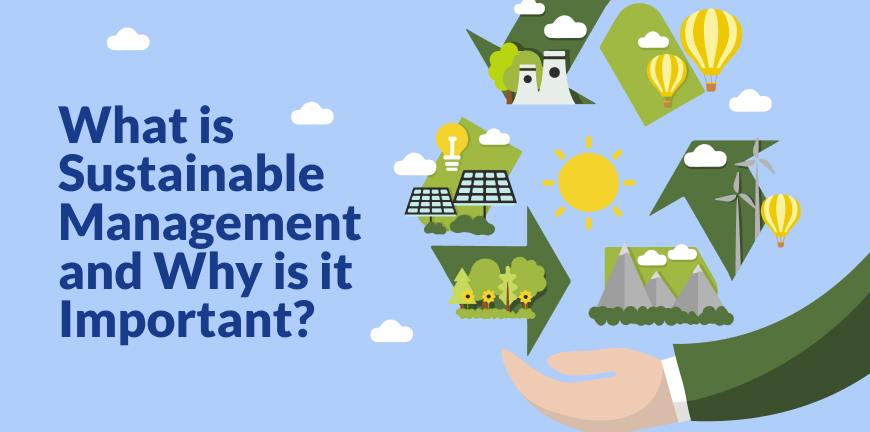
Building Winning Teams in the GCC: What Employers Need to Know About Recruitment Today
08/07/2025
What Is Site Reliability Engineering (SRE)? Benefits, Practices & Implementation
08/07/2025- What is Sustainable Management?
- Why is Sustainable Management Important?
- What are the Benefits of Sustainable Management?
- How Sustainable Management Contributes to Business Strategy
- What Are the Core Concepts of Sustainable Management?
- What are the Common Sustainable Management Practices
- What are the Challenges in Sustainable Management
- What is the Future of Sustainable Management
- Conclusion
- Frequently Asked Questions (FAQs)
A successful business is not one that makes the most revenue and profits, but also puts efforts towards being socially and environmentally responsible. This is where sustainable management comes in. Sustainable management means the principles of sustainability and management coming together to create a business model that benefits future generations.
What is Sustainable Management?
Sustainable Management is the responsible use of resources to run a business or organization while striking a balance between its economic success and environmental and social responsibility. The main aim of sustainable management is to incorporate strategies that help meet the current needs of an organisation while being socially and environmentally responsible, as well as ensure that these strategies don’t impact the ability of future generations to meet their needs.
Why is Sustainable Management Important?
Effective sustainable management-
- Allows organizations to cut fuel costs and help reduce water and air pollution
- Gives rise to sustainable development and secures a sustainable future
- Reduces the impact on the environment and promotes social responsibility while upholding economic growth
- Prepares organizations to adapt to the changes in the environment and use their resources mindfully.
What are the Benefits of Sustainable Management?
- When companies demonstrate their commitment towards environmental sustainability and social responsibility, it automatically puts them in good light and enhances their brand reputation. This leads to better trust among customers.
- Sustainable technology is well-reputed for saving costs and speeding up productivity. Better productivity means improved output and reduced costs, shows an efficient use of resources and equipment.
- The drastic climate change has left the government with no option but to impose stringent regulations. With the help of sustainability management, businesses can comply with these regulations easily.
- Waste reduction is another significant benefit of sustainability. Any business adopting sustainability management would reduce its waste footprint by switching to sustainable products in production and consumption.
- Sustainable management in businesses can minimize energy consumption to a large extent, streamline processes to reduce waste generation, resulting in cost savings and long-term financial stability.
- Helps companies achieve quality output paired with improved trust and loyalty with customers, investors, employees, and communities through transparent sustainability commitments and reporting
- Implementing sustainable strategies requires teamwork and fosters a collaborative culture in the organization. This leads to innovation and supports healthy growth on an enterprise level.
How Sustainable Management Contributes to Business Strategy
- Being committed to sustainable practices shows a company’s commitment to social and environmental sustainability. This builds loyalty, trust, and enhances brand image
- Energy efficiency and reduced waste lower operational costs and help improve the use of resources
- By adapting to changing environmental regulations and addressing the potential risks to the social circle and environment, businesses can avoid operational disruptions
- By embracing sustainable practices, businesses can look into new markets, products, and services, giving themselves a competitive advantage
- Employees today like to see companies’ commitment to society and the environment. And companies that do so can attract talent who align with your goals and help improve your performance
What Are the Core Concepts of Sustainable Management?
1. Triple bottom line
- Being socially responsible, paying attention to employee well-being
- Preserve the environment, maintain ecological balance
- Better economic performance in the long term.
2. Creating value in the long term
Sustainable practices lead to businesses using their resources efficiently and thinking of long-term profits.
3. Resource efficiency and circular economy
Material and energy can be used while making sure a reduction in waste and emissions. By adopting recycling, reusing, the life cycle of products can be extended.
4. Ethical governance and accountability
By having the right and transparent regulatory framework with clear values, the maintenance of ethical practices and sustainability can move forward.
5. Stakeholders’ engagement
Everyone, including employees, customers, suppliers, regulators, etc, no matter what expectations they have, sustainable management must address them all.
6. Risk management
If there are any risks related to a change in environment, regulations, or social expectations, these must be eliminated as quickly as possible.
What are the Common Sustainable Management Practices
1. Sustainability Strategy Development
A unique set of strategies are deployed like building road maps, carbon offsetting, circular economy, green supply chain, gaining international ESG certifications, etc., to integrate sustainability principles with business goals, regulatory mandates, workplace culture, customer experience, and brand improvement activities, helping our clients improve resilience and create 360° value.
2. Sustainable Supply Chain Management
Building an ESG-compliant supply chain ecosystem. Through fully transparent supplier practices, there is implementation of green logistics, waste reduction, lifecycle assessments, and other innovative strategies from end-to-end to achieve sustainability goals. These efforts lead to higher productivity, a better workplace, enhanced brand value, and attract global investment.
3. Carbon Footprint Assessment
A sustainable management consultancy will measure and analyze greenhouse gas emissions across operations, supply chains, and products. The expert sustainable management consultants will provide actionable insights to reduce carbon impact and achieve 100% ESG compliance.
4. Environmental Compliance & Reporting
Through sustainable project management, we will ensure our clients streamline their internal operations according to environmental laws and standards, along with transparent sustainability reporting for stakeholders, regulators, and ESG investors.
5. Waste Reduction & Circular Economy Solutions
A sustainable management service provider will design specifically curated programs to minimize waste, promote recycling, adopt circular economy models, drive resource efficiency, and achieve long-term environmental benefits.
What are the Challenges in Sustainable Management
1. Striking a balance between profit and purpose
While investing in green technologies is important, it also increases the short-term costs that can be dismissed by stakeholders who are looking at profitability
2. Unclear strategy
If businesses don’t have a proper strategy to integrate sustainable strategies into their business, then the sustainable initiatives may lose their effect.
3. High costs
Resorting to eco-friendly practices, incorporating sustainable materials into production and development can burn a hole in your pocket.
4. Not able to measure the impact
Measuring the carbon footprint, water usage, etc, is not easy without the right tools or metrics. This can lead to ineffective performance.
5. Supply chain complexity
Making sure all the vendors, supplies, and industries are following sustainable practices and are adhering to the regulations is difficult.
6. Lack of expertise and resources
If a company does not have access to a sustainability expert or lacks resources to implement the strategies, it’s a clear problem.
7. Inconsistent regulations and standards
Different regions may have different regulations with respect to sustainability. This can create confusion and make compliance difficult.
What is the Future of Sustainable Management
- The adoption of globally approved sustainability standards by companies that deliver products and services across geographies without any strings attached enhances customer and stakeholder trust, along with creating a competitive edge.
- Investors are now demanding integrated sustainability reporting paired with financial audits to make future investments.
- The integration of advanced technologies drives efficient, accurate, and scalable sustainability reporting to meet evolving regulatory and market needs.
- Double materiality adoption fosters stakeholder-centric reporting, balancing financial performance with environmental and social impact considerations.
- To achieve net-zero emissions by 2050, there is a huge surge in renewable energy investments, giving companies across the globe a great opportunity to include sustainability commitments to attract more investment.
Conclusion
While making profits will always be a priority, businesses must think of the long-term goals of their organisations and incorporate sustainable practices. In the constantly changing market, sustainable management not only helps businesses stay afloat but also helps increase their productivity and profitability.
Frequently Asked Questions (FAQs)
1. What is the meaning of sustainable management?
Sustainable management is a mix of sustainability and management concepts to help businesses meet their future needs.
2. Why is sustainable management important?
Sustainable management allows organizations to cut fuel costs and help reduce water and air pollution, gives rise to sustainable development and secures a sustainable future, reduces the impact on the environment, and promotes social responsibility while upholding economic growth.
3. What are the key principles of sustainable management?
Sustainable development is built around three core pillars: economic growth, social equity, and environmental protection. To experience economic growth, a business must also take social equity and its effect on the environment into consideration.
4. How can businesses implement sustainable management?
Reduced costs for energy, waste, and water, improved competitiveness, more resilience to price fluctuations, and future-proofing your operations against upcoming environmental legislation can all be achieved through monitoring and managing your resource use and investing in the right technologies.
5. What is the difference between sustainable management and traditional management?
Traditional management often prioritizes short-term financial gains and may overlook the long-term environmental and social impacts of decisions. Sustainable management, on the other hand, adopts a holistic approach, balancing economic, social, and environmental considerations to ensure long-term viability and well-being.
Contact Us For Business Enquiry

Rajkumar Shanmugam
Rajkumar Shanmugam is the Head of HR at ALP Consulting, bringing over 19 years of comprehensive HR leadership experience across India and international markets. His expertise spans talent acquisition, employee relations, performance management, compliance, and HR transformation. Rajkumar has a proven track record of driving people-centric initiatives, enhancing workplace culture, and aligning HR strategy with business goals. With extensive experience in US staffing operations and global mobility, he continues to lead organizational excellence through innovation and employee engagement.




